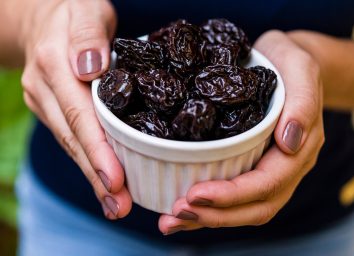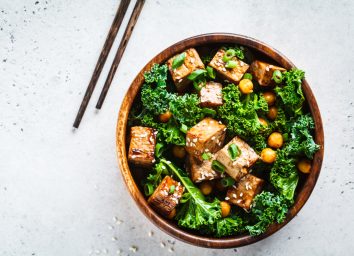Best Supplements for Preventing Bone Loss, Say Dietitians
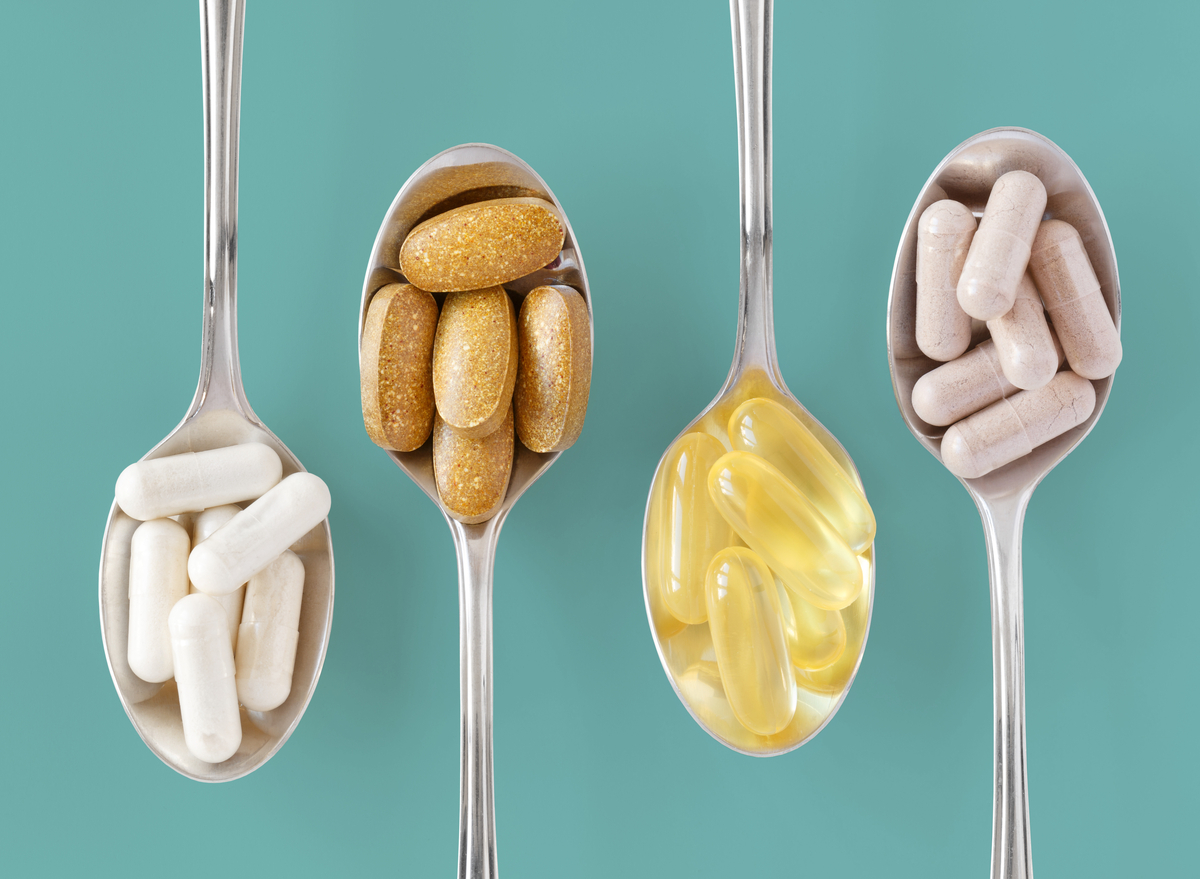
Osteoporosis is no fun. The disease of having brittle bones means you’re more likely to suffer a fracture. As we age, maintaining healthy bones is of particular importance to help us stay strong and independent. So is there anything we can do? Yes.
“While an individual may have weak bones due to some factors that are completely out of control, like our genetics, there are some lifestyle changes we can take that may support bone health,” says registered dietitian Lauren Manaker, MS, RDN, LD, for Zhou Nutrition. “Participating in weight-bearing exercise, eating a diet rich in calcium and other bone-building nutrients, and avoiding cigarette smoking can all support bone health.”
Calcium isn’t the only mineral that supports bone health, and there are many surprising foods that support this essential body part. “Certain foods really make a difference in your bone health. For instance, research in Osteoporosis International found that eating five to six prunes a day can help prevent bone loss,” says, Amy Gorin, MS, RDN, an inclusive plant-based dietitian and owner of Master the Media.
While it is possible to eat a diet rich in bone health-supporting nutrients, “you may not be getting all the nutrients you need—and in the amounts you need them—from diet alone, which is when supplements can be helpful for bone health,” says Gorin.
For that reason, we rounded up six supplements that may help prevent bone loss. As always, consult with a trusted healthcare professional before adding a new supplement to your routine. Read on, and for more on how to eat healthy, don’t miss The #1 Best Juice to Drink Every Day, Says Science.
Calcium
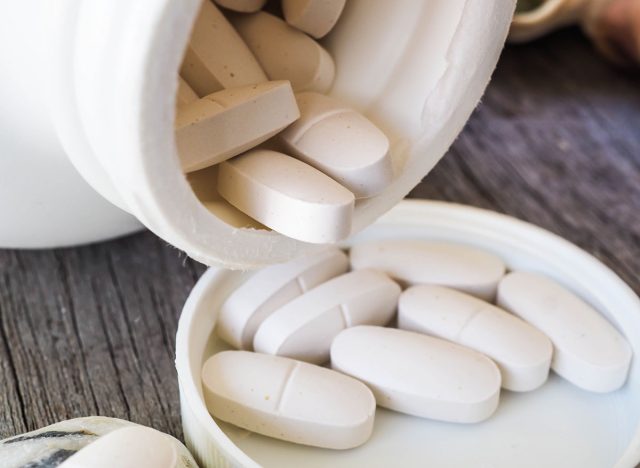
Let’s dive into the nutrient most associated with bone health first. “Calcium is one of the major building blocks of our bones, but it also serves some other important functions in our bodies (like helping the heartbeat),” says Kim Yawitz, RD, a nutritionist and gym owner based in St. Louis, Missouri, noting that our bodies will pull calcium out of the bones and into the blood when we don’t eat enough calcium-rich foods to support these important bodily functions.
“Since an estimated 39 percent of Americans fall short of the recommendations for daily calcium intake, a supplement could help prevent bone loss,” she continues, highlighting one large meta-analysis, in which calcium supplements led to modest increases in bone mineral density, as did eating more calcium-rich foods.
“Your best bet is to get 1,000 to 1,200 milligrams per day from your diet, but a supplement can help if you struggle to hit that goal,” she recommends.
Magnesium

Magnesium helps to maintain a healthy balance between osteoblasts and osteoclasts—cells that build up and break down the bones, respectively. “It also helps to regulate parathyroid and vitamin D levels, both of which impact the amount of calcium in the bones,” Yawitz says, noting that studies suggest that people who eat more magnesium-rich foods have stronger bones, while up to 40 percent of adults with osteoporosis have a magnesium deficiency.
“This mineral is important for bone health, and a recent review study in BioMetals found that supplementing with magnesium benefits bone mineral density and also reduces the risk of fractures,” adds Gorin.
While more research will be helpful to add evidence to these findings, Yawitz says that you might benefit from taking a supplement if you’re among the estimated 60 percent of adults who don’t get enough magnesium in the diet.
Vitamin C
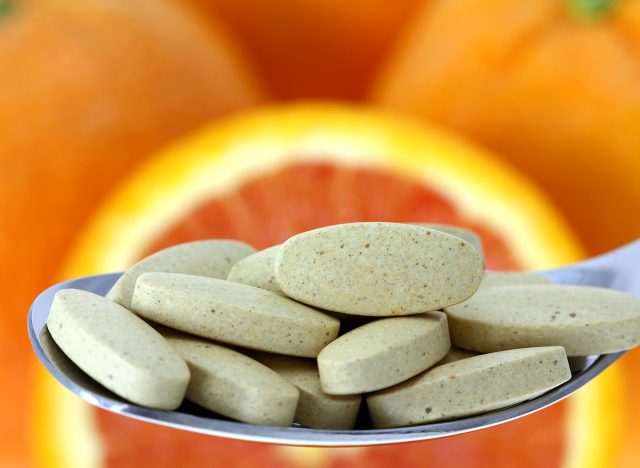
Vitamin C is also likely your friend when it comes to potentially aiding in bone health. “Vitamin C is essential in the production of collagen in the bone matrix. It also scavenges free radicals detrimental to bone health,” says Manaker. “As such, taking a vitamin C supplement is one that may support bone health.”
To get more vitamin C in your diet, check out Popular Foods With More vitamin C Than an Orange.
Soy Isoflavones
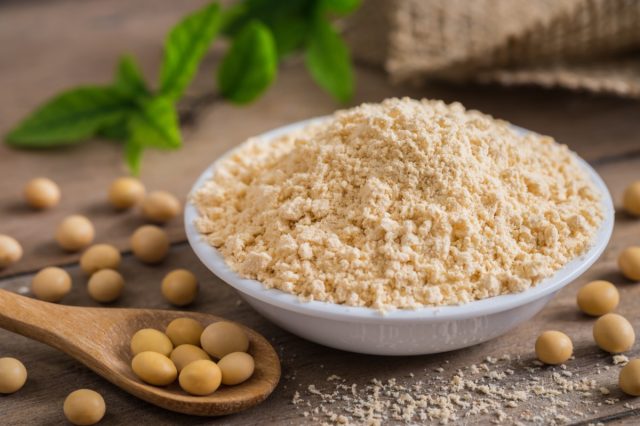
Ladies, this one is for you. “Women lose up to 20 percent of their bone mass during menopause when decreased estrogen levels cause bone tissue to be broken down faster than it can be replaced,” explains Yawitz. “One potential way to slow bone loss is to supplement with soy isoflavones, which are substances found in soybeans that mimic the effects of estrogen in the body.”
To bolster that belief? “In one meta-analysis, women taking soy isoflavone supplements saw an average increase of 54 percent in bone density and also showed signs of decreased bone loss,” says Yawitz, adding that doses in the studies included in this meta-analysis ranged from 22.7 to 120 milligrams per day, in capsule form.
Vitamin D
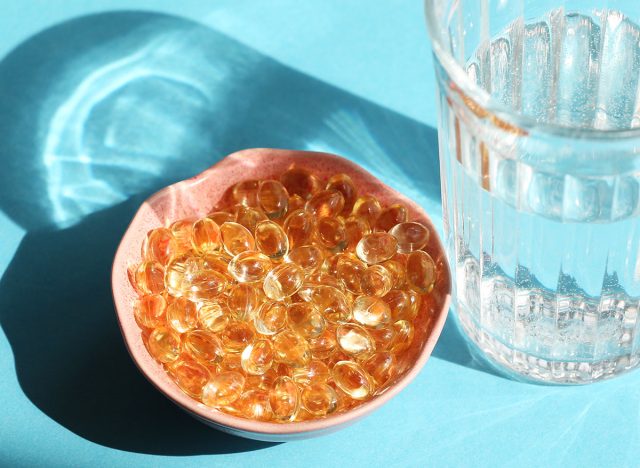
“This fat-soluble vitamin is very important for bone health. Having low blood levels can negatively affect bone health, especially as you get older. This is because vitamin D helps your body absorb calcium, and not having enough vitamin D may make your bones more likely to break,” says Gorin.
“The tricky part is that taking in too much vitamin D via supplements has been linked with negative effects, such as a higher risk of bone fractures in older adults,” she continues, stressing that this is why it’s best to talk with a trusted healthcare provider about if and how much vitamin D you should be supplementing with daily.
Vitamin K

“Vitamin K helps to ensure calcium accumulates in the bones instead of in the soft tissues such as blood vessels. This helps maintain bone structure. Research shows that vitamin K supplementation may decrease risk of bone fractures in women with osteoporosis,” says Mascha Davis MPH, RDN, Registered Dietitian Nutritionist, founder of sustainable seafood snack MiniFish.co and author of Eat Your Vitamins.
FYI: Davis says it’s ideal to find a supplement that provides both vitamin K and D since “these two nutrients work synergistically to ensure calcium levels are adequate and unnecessary bone loss doesn’t occur.”

